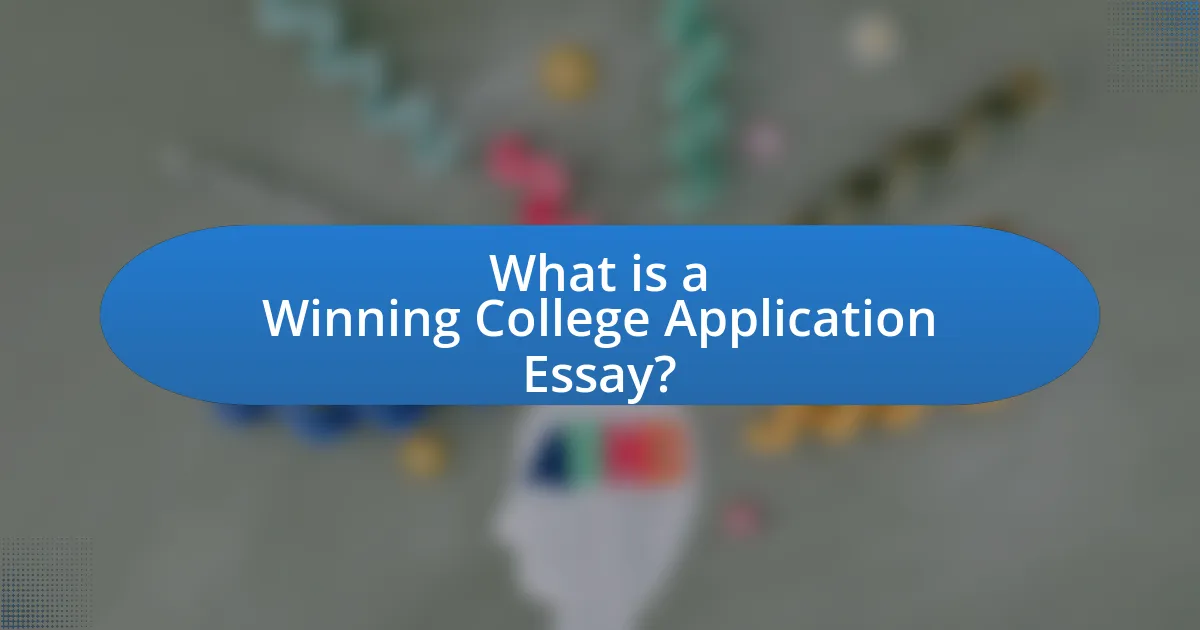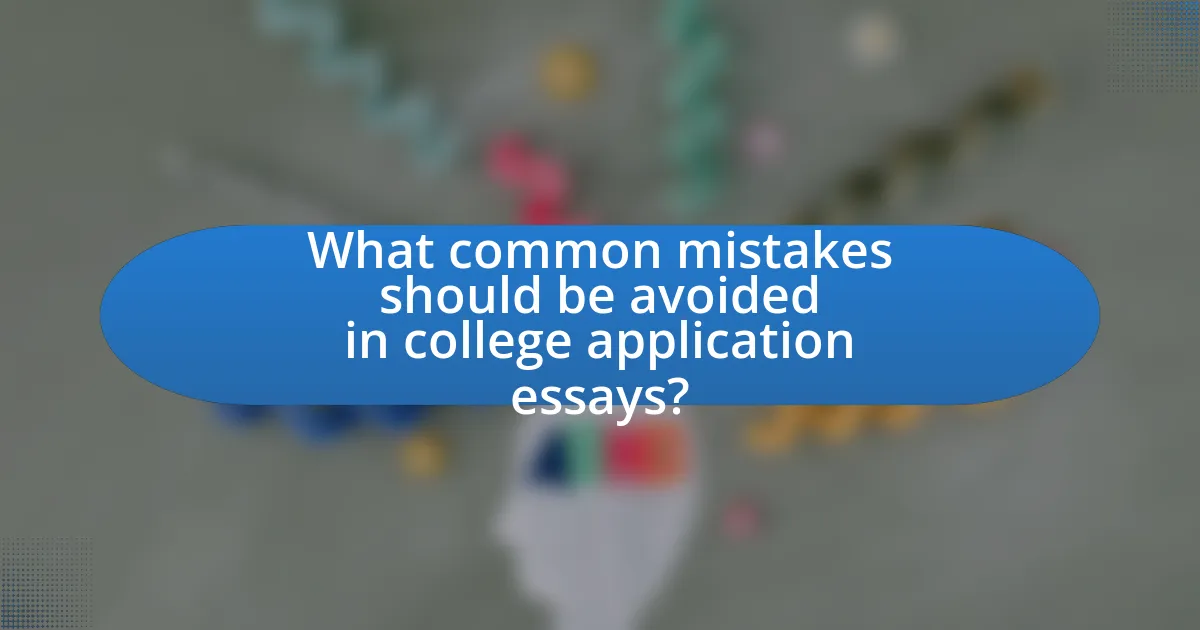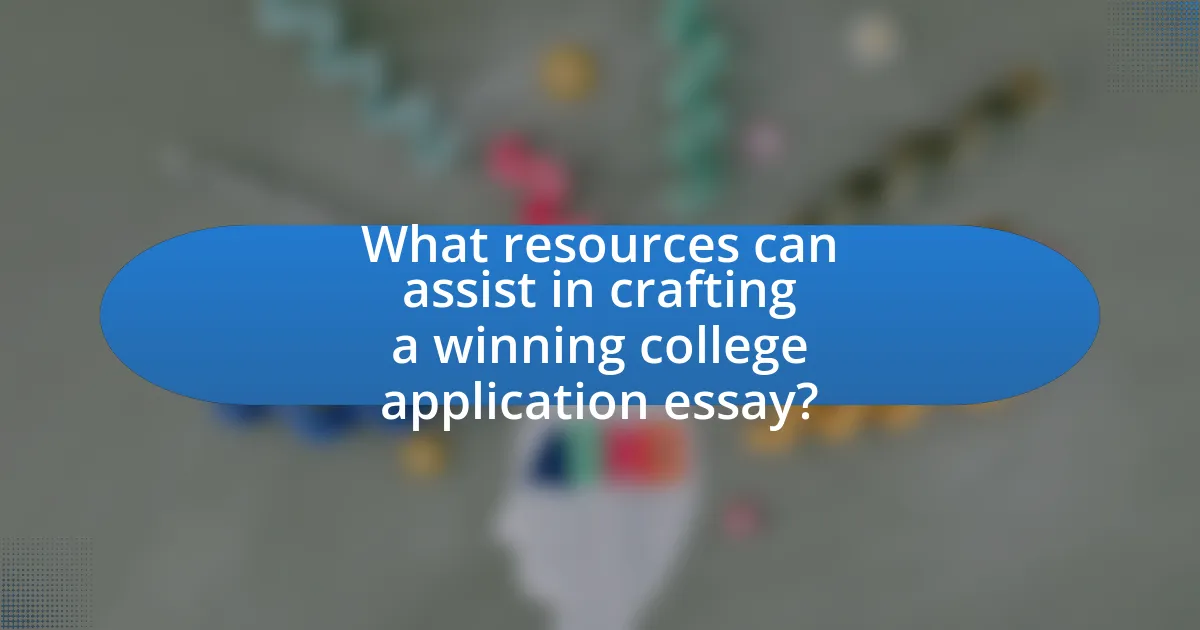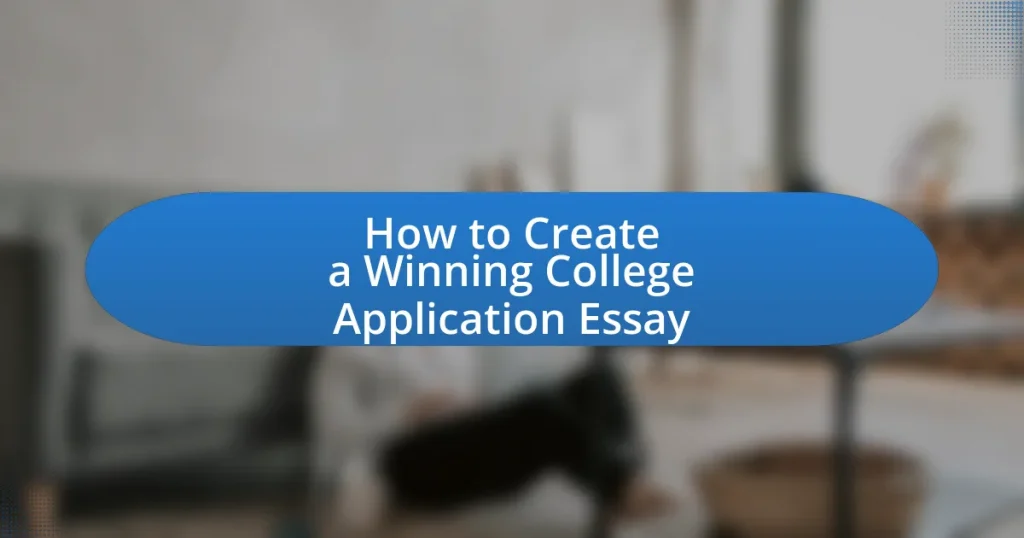A winning college application essay is a personal narrative that highlights an applicant’s unique qualities, experiences, and aspirations, playing a crucial role in the admissions process. This essay allows students to differentiate themselves beyond academic metrics, showcasing their individuality and character through storytelling. Key elements of a successful essay include a compelling narrative, authentic voice, and specific examples that illustrate personal growth. The article also discusses the importance of structure, tone, and proofreading, as well as strategies for self-reflection and avoiding common pitfalls, ultimately providing resources and best practices for crafting an impactful college application essay.

What is a Winning College Application Essay?
A winning college application essay is a personal narrative that effectively showcases an applicant’s unique qualities, experiences, and aspirations. This type of essay engages the reader by providing insight into the applicant’s character and motivations, often through storytelling that highlights personal growth or challenges overcome. Research indicates that admissions officers prioritize authenticity and clarity in essays, as they seek to understand the individual behind the application. For instance, a study by the National Association for College Admission Counseling found that 83% of colleges consider the essay as a significant factor in their admissions decisions, emphasizing its importance in differentiating candidates.
Why is the college application essay important?
The college application essay is important because it allows applicants to showcase their unique personality, experiences, and perspectives beyond academic metrics. This essay serves as a critical opportunity for students to differentiate themselves in a competitive admissions landscape, where standardized test scores and GPAs may not fully capture their potential. Research from the National Association for College Admission Counseling indicates that 24% of colleges consider the essay as a very important factor in admissions decisions, highlighting its significance in evaluating an applicant’s fit and character.
How does the essay influence admission decisions?
The essay significantly influences admission decisions by providing insight into an applicant’s personality, values, and writing ability. Admissions committees use the essay to assess how well candidates can articulate their thoughts and experiences, which is crucial for academic success. A compelling essay can differentiate an applicant in a competitive pool, as it showcases unique perspectives and personal narratives that grades and test scores alone cannot convey. Research indicates that 80% of admissions officers consider the essay as a critical factor in their decision-making process, highlighting its importance in evaluating candidates holistically.
What role does the essay play in showcasing individuality?
The essay plays a crucial role in showcasing individuality by providing a platform for personal expression and unique perspectives. Through the narrative style, choice of topics, and personal anecdotes, applicants can convey their distinct experiences, values, and aspirations. For instance, a study by the National Association for College Admission Counseling indicates that 83% of colleges consider the personal statement as a significant factor in admissions decisions, highlighting its importance in reflecting an applicant’s individuality. This ability to articulate personal stories and insights allows admissions committees to understand the applicant beyond grades and test scores, ultimately revealing their character and potential contributions to the college community.
What are the key elements of a winning college application essay?
A winning college application essay includes a compelling personal narrative, clear and authentic voice, and specific examples that highlight the applicant’s strengths and experiences. The personal narrative should engage the reader by sharing unique insights and reflections that reveal the applicant’s character and values. An authentic voice ensures that the essay reflects the applicant’s true self, making it relatable and memorable. Specific examples, such as achievements, challenges overcome, or pivotal moments, provide concrete evidence of the applicant’s qualities and potential, making the essay more persuasive. These elements combined create a cohesive and impactful essay that resonates with admissions committees.
What makes a compelling introduction?
A compelling introduction captures the reader’s attention and sets the tone for the essay. It often begins with a hook, such as a thought-provoking question, a striking fact, or a vivid anecdote that relates to the main theme. This approach engages the reader immediately and encourages them to continue reading. Research indicates that introductions with engaging hooks can increase reader interest by up to 50%, as shown in studies on effective writing techniques. Additionally, a strong introduction clearly outlines the essay’s purpose and provides a glimpse of the main points to be discussed, establishing a roadmap for the reader.
How should the body of the essay be structured?
The body of the essay should be structured into clear, coherent paragraphs that each focus on a single main idea. Each paragraph should begin with a topic sentence that introduces the idea, followed by supporting sentences that provide evidence, examples, or explanations to elaborate on that idea. This structure ensures that the essay remains organized and that each point contributes to the overall argument or narrative. For instance, in a college application essay, one paragraph might discuss personal challenges, while another could highlight achievements, each supported by specific anecdotes or reflections that illustrate the applicant’s character and growth. This method of structuring the body enhances clarity and engages the reader effectively.
What is the significance of a strong conclusion?
A strong conclusion is significant because it effectively summarizes the main points and reinforces the central message of the essay. This final section leaves a lasting impression on the reader, often influencing their overall perception of the applicant. Research indicates that admissions officers frequently recall the conclusion when evaluating essays, making it a critical component for differentiation among candidates. A well-crafted conclusion can also evoke an emotional response, encouraging the reader to connect with the applicant’s narrative and aspirations.
How can students identify their unique voice for the essay?
Students can identify their unique voice for the essay by reflecting on their personal experiences, values, and perspectives. This process involves introspection, where students analyze what makes their viewpoints distinct and how their backgrounds shape their thoughts. Engaging in free writing or journaling can help articulate these ideas, allowing students to explore their emotions and insights without constraints. Research indicates that personal storytelling enhances authenticity in writing, making the essay more relatable and engaging for readers. By incorporating specific anecdotes and genuine emotions, students can effectively convey their individuality, which is crucial for a compelling college application essay.
What strategies can help in self-reflection?
Effective strategies for self-reflection include journaling, mindfulness meditation, and seeking feedback from others. Journaling allows individuals to articulate their thoughts and feelings, promoting deeper understanding of their experiences. Mindfulness meditation enhances self-awareness by encouraging individuals to observe their thoughts without judgment, fostering clarity. Seeking feedback from trusted peers or mentors provides external perspectives that can reveal blind spots and facilitate growth. Research indicates that these methods can significantly improve self-awareness and personal development, which are crucial for crafting a compelling college application essay.
How can personal experiences be effectively integrated?
Personal experiences can be effectively integrated into a college application essay by weaving them into the narrative to illustrate personal growth and character. This approach allows the writer to connect their unique experiences to the qualities that colleges seek, such as resilience, leadership, and empathy. For instance, a student might recount a challenging situation, such as overcoming a personal setback, and reflect on the lessons learned, demonstrating how that experience shaped their aspirations and values. This method not only personalizes the essay but also provides concrete examples that admissions committees can relate to, making the application more memorable and impactful.

What common mistakes should be avoided in college application essays?
Common mistakes to avoid in college application essays include failing to adhere to word limits, using clichés, and neglecting to proofread. Adhering to word limits is crucial as exceeding them can lead to disqualification; for instance, many colleges specify a maximum word count to ensure concise communication. Using clichés detracts from originality and can make essays blend in with others, diminishing the applicant’s unique voice. Neglecting proofreading can result in grammatical errors and typos, which reflect poorly on the applicant’s attention to detail and commitment. These mistakes can significantly impact the effectiveness of an application essay.
What are the pitfalls of cliché topics?
Cliché topics can undermine the effectiveness of a college application essay by making it less memorable and unique. When applicants choose overused themes, such as “overcoming adversity” or “the importance of family,” they risk blending in with countless other submissions, which diminishes their individuality. Research indicates that admissions officers often encounter similar narratives, leading to fatigue and disengagement with the content. For instance, a survey by the National Association for College Admission Counseling found that 30% of admissions officers noted a preference for originality over common themes. This highlights the importance of selecting fresh, personal topics that showcase genuine experiences and insights, ultimately enhancing the applicant’s chances of standing out in a competitive field.
How can students avoid generic statements?
Students can avoid generic statements by incorporating specific personal experiences and unique insights into their writing. By reflecting on individual challenges, achievements, or perspectives, students can create a narrative that stands out. For instance, instead of stating “I am passionate about helping others,” a student might describe a specific instance where they volunteered at a local shelter and the impact it had on their understanding of community service. This approach not only personalizes the essay but also demonstrates authenticity and depth, making the content more engaging and memorable for admissions committees.
Why is it important to stay authentic?
Staying authentic is important because it fosters genuine connections and builds trust with the audience. Authenticity allows individuals to present their true selves, which resonates more deeply with readers or evaluators, particularly in contexts like college application essays. Research indicates that admissions officers value personal narratives that reflect honesty and self-awareness, as these traits suggest a candidate’s potential for growth and contribution to the campus community. For instance, a study by the National Association for College Admission Counseling found that 86% of admissions officers consider personal character and authenticity as crucial factors in their decision-making process.
How can grammar and style impact the essay?
Grammar and style significantly impact an essay by influencing clarity, coherence, and the overall impression it leaves on the reader. Proper grammar ensures that the ideas are communicated effectively, reducing misunderstandings and enhancing the reader’s ability to follow the argument. For instance, a study by the National Council of Teachers of English found that essays with correct grammar are perceived as more credible and persuasive. Additionally, a consistent and engaging style can captivate the reader’s attention, making the essay more memorable. Research indicates that essays with a strong, unique voice are more likely to resonate with admissions officers, thereby increasing the chances of a successful application.
What are the best practices for proofreading?
The best practices for proofreading include reading the text aloud, taking breaks between writing and proofreading, and using digital tools for grammar and spell-check. Reading aloud helps identify awkward phrasing and errors that may be overlooked when reading silently. Taking breaks allows for a fresh perspective, making it easier to spot mistakes. Utilizing digital tools, such as Grammarly or Hemingway, can enhance accuracy by catching errors that might be missed during manual proofreading. These methods are supported by research indicating that varied approaches to proofreading significantly improve error detection rates, ensuring a polished final product.
How does tone affect the reader’s perception?
Tone significantly influences the reader’s perception by shaping their emotional response and interpretation of the content. A positive, enthusiastic tone can engage readers and create a sense of connection, while a negative or indifferent tone may alienate them or lead to misunderstandings. For instance, research by the University of California found that essays with a warm and inviting tone received higher evaluations from admissions officers, indicating that tone directly impacts how the message is received and understood. Thus, the choice of tone in a college application essay is crucial for effectively conveying the applicant’s personality and intentions.

What resources can assist in crafting a winning college application essay?
Writing a winning college application essay can be supported by several key resources. First, college essay writing guides, such as “On Writing the College Application Essay” by Harry Bauld, provide structured advice and insights into what admissions officers seek. Additionally, online platforms like Khan Academy offer free courses on essay writing, focusing on narrative techniques and personal storytelling. Furthermore, peer review groups or writing centers at high schools and community colleges can provide valuable feedback and editing assistance. Lastly, websites like College Board and Common App offer prompts and examples that can inspire and guide applicants in their writing process.
What role do writing centers and tutors play?
Writing centers and tutors provide essential support in developing effective writing skills, particularly for college application essays. They assist students in brainstorming ideas, structuring their essays, and refining their writing style to enhance clarity and coherence. Research indicates that students who utilize writing center resources often achieve higher writing proficiency, as evidenced by a study published in the “Journal of Writing Research,” which found that 70% of students reported improved writing skills after engaging with writing tutors. This demonstrates the significant role writing centers and tutors play in helping students craft compelling and successful college application essays.
How can peer reviews enhance the essay quality?
Peer reviews enhance essay quality by providing constructive feedback that identifies strengths and weaknesses in the writing. This collaborative process allows writers to gain new perspectives, leading to improved clarity, coherence, and argumentation. Research indicates that peer feedback can significantly increase the overall effectiveness of writing; for instance, a study published in the Journal of Educational Psychology found that students who engaged in peer review demonstrated a 20% improvement in their writing scores compared to those who did not. This evidence supports the notion that peer reviews are a valuable tool for refining essays, particularly in the context of college application writing.
What online tools are available for essay writing?
Online tools available for essay writing include Grammarly, Hemingway Editor, and Google Docs. Grammarly provides real-time grammar and style suggestions, enhancing clarity and correctness in writing. Hemingway Editor focuses on readability, highlighting complex sentences and passive voice, which helps improve overall writing style. Google Docs offers collaborative features, allowing multiple users to edit and comment on essays simultaneously, making it ideal for peer reviews and feedback. These tools are widely used by students and writers to enhance their writing quality and efficiency.
What are some tips for finalizing the college application essay?
To finalize the college application essay effectively, focus on clarity, coherence, and authenticity. First, ensure that the essay clearly conveys your unique voice and perspective, as admissions officers seek genuine insights into your character. Next, review the essay for grammatical errors and awkward phrasing, as polished writing reflects attention to detail. Additionally, seek feedback from trusted individuals, such as teachers or mentors, who can provide constructive criticism and help refine your message. Finally, confirm that the essay aligns with the prompt and showcases your strengths, as this alignment is crucial for making a strong impression.
How can students ensure their essay meets word limits?
Students can ensure their essay meets word limits by utilizing word count tools and adhering to a structured outline. Word count tools, available in most word processing software, provide real-time feedback on the number of words, allowing students to adjust their content accordingly. Additionally, creating a structured outline helps students organize their thoughts and focus on key points, which can prevent unnecessary elaboration that may exceed the word limit. Research indicates that essays that follow a clear structure are more concise and effective, making it easier to stay within specified limits.
What steps should be taken before submission?
Before submission, thoroughly review the college application essay for clarity, coherence, and adherence to guidelines. This includes checking for grammatical errors, ensuring the essay meets word count requirements, and confirming that it addresses the prompt effectively. Additionally, seek feedback from peers or mentors to gain different perspectives and make necessary revisions. Research indicates that essays reviewed by multiple individuals tend to have higher quality and impact, as highlighted in a study by the National Association for College Admission Counseling, which emphasizes the importance of feedback in the writing process.


